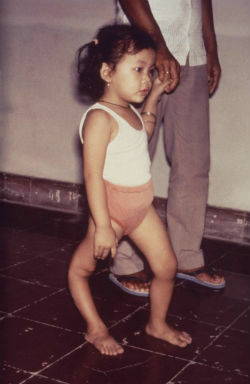Polio, also called infantile paralysis, is a infectious disease caused by viruses (poliovirus).
It usually occurs in children up to 5 years of age, but it can occur in adults who have not had the vaccine.
Polio is a very serious disease that can lead to paralysis of the lower limbs and, in the worst case, to the death of patients.
 Child with polio sequelae
Child with polio sequelae
In addition to the flaccidity of limb muscles (partial or total) that can lead to paralysis, the virus can also reach the respiratory muscles, causing respiratory arrest.
The polio virus, found in the bloodstream, first reaches the intestine and can reach the nervous system.
Polio has three poliovirus serotypes:
- Type 1
- Type 2
- Type 3
Fortunately, vaccination campaigns that have taken place since the 1960s have reduced the appearance of the virus.
Learn more about Virus.
Cause and Transmission
The main cause of polio is the lack of sanitation. Therefore, disadvantaged communities have a great potential to contract the virus.
Transmission occurs mainly through untreated water, poorly washed food, in addition to the feces and secretions of those contaminated (sneezing, coughing, saliva, etc.).
As it is a contagious disease, people who have contracted the virus must remain away during treatment.
Symptoms
The incubation period for the virus is one to two weeks. However, it can reach a month.
The symptoms of polio appear about three days after contracting the virus, the main ones being:
- low fever
- Diarrhea
- Fatigue
- Nausea and vomiting
- Abdominal pain
- headache and throat
- limb pain
- malaise
Treatment
As it is a disease caused by a virus, polio does not have a specific treatment.
That's because our body creates the antibodies needed to fight it. However, during the virus incubation period some measures must be taken:
- rest
- Nutrient-rich food
- drinking lots of fluids
- Use of analgesics and antipyretics
Note: If the person is affected in a more severe way, such as paralysis, physiotherapy may be recommended by the doctor.
Polio Vaccine: Prevention
Prevention of the disease is done through oral vaccine (2 drops) and injection. It is very important to vaccinate children up to 5 years old, which is done in four or five doses.
It has an effectiveness of 95% and fights the virus for a long period of time. This vaccine usually has no side effects, but if the child has diarrhea or vomiting, the dose should be taken again as it may not have been absorbed into the body.
In addition, it is recommended to wash your hands and food thoroughly before consuming them.
Polio in Brazil
In the late 1980s, cases of polio were found in the country. Since then, vaccination campaigns have taken place every year at health posts and, currently, the disease is eradicated in Brazil.
2016 Vaccination Campaign
In 2016, the health centers promoted the national vaccination campaign against various diseases. They are: polio, tuberculosis, rotavirus, measles, rubella, whooping cough, mumps, HPV, among others.

